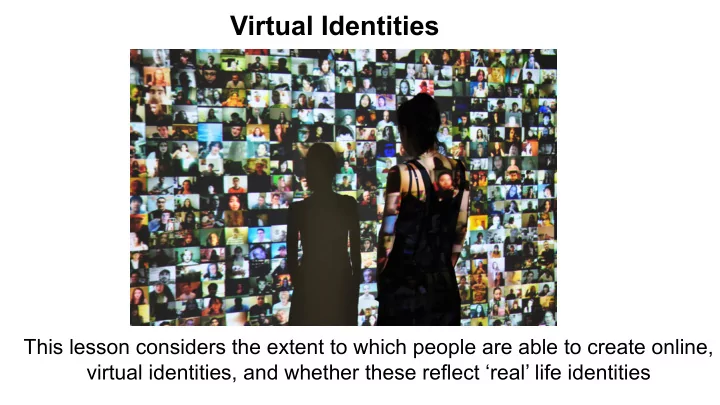

Virtual Identities This lesson considers the extent to which people are able to create online, virtual identities, and whether these reflect ‘real’ life identities
On The Internet Nobody Knows You Are A Dog! This cartoon from the early days of the internet (1990s) showed how we could be anonymous when we went online. We could pretend to be who we wanted to be. A dog did not have to be a dog!
But now things have changed. Our personal lives are splashed all over social media platforms. Internet providers and large marketing corporations know vast amounts about us – Probably more than we would like them to know!
Every time you do an internet search, ‘like’ something on social media or use your bank card to make a purchase, another aspect of your identity is stored somewhere in a large internet database. Should we be worried about this?
Communicating through e-mails, tweeting, checking Facebook, following blogs, sharing a video on YouTube or playing an online game are just some forms of the 21st century style virtual social interaction . These digital interactions turn attention from the real world to the virtual world where people can create a different identity than the one they have in the real world. Today individuals have the chance to renew their identities with the help of internet, creating a virtual identity as they wish to have in the real world. Although these virtual identities are shaped by individuals themselves, it is sometimes difficult for internet users to exit the digital world and return to their former non-virtual life-style .
Sociologists are becoming really interested in this area of virtual identity . These are the aspects of ourselves that we post online – quite frequently, they offer a false impression of the real person behind the posting. So, the photographs and information about us online may very well be misleading. How often do you check or update your social media profile? How often do you add moments of your daily life to your social media account? How often does this contribute towards the ‘cool’ online you?
Read the article – ‘ Time to Disconnect ’. This deal with the issue of virtual identity and the pressure are all under to present ourselves in a positive light in the virtual world. However, the article warns of the dangers of losing touch with the real essence of our identity and the genuine things which make us who we really are. Answer these questions: (merge your answers into one paragraph) [01] Are you living the life you want to be living, or the life other people want you to live? [02] If you have a social media profile (and I am sure that you all do), how different is your virtual identity from you personal identity?
Rank these factors in terms of how important they are in contributing towards your identity. • Your age • Your sexuality • Your nationality • Your area of residence • Your gender • Your body shape / height • Your skin colour • Your interests and hobbies • Your cultural tastes • Your social media profile • Your physical imperfections (if any) • Your family income • Your ethnicity
Who was George Orwell? Find out about George Orwell Who was he? Who was Big Brother? (nothing to do with the Channel 4 TV series) What is ‘1984’? Final question (a few sentences please) Are you concerned with all of your personal information being stored online?
Recommend
More recommend